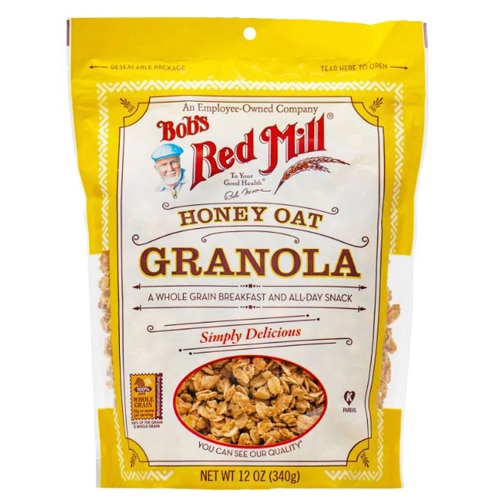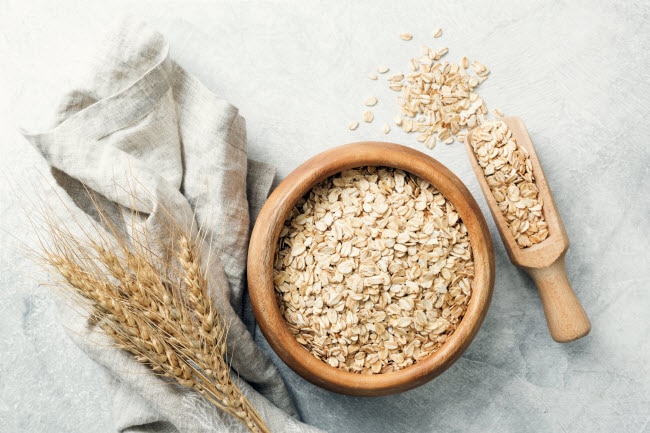Whole grains offer many benefits that you’re probably aware of. Despite hearing about them often, there may be some things about them you don't know. Many people are still confused about what ‘whole grains’ are, and how much you should be getting in your diet. To clear up confusion, let’s go over some of the basics.
Facts about grains
What are whole grains?
A whole grain is a grain that hasn’t been refined and still contains all the natural parts of a whole grain kernel. These include the bran (the outer, fiber-rich layer), the germ (the innermost part of the whole grain which is rich in vitamins and minerals) and the endosperm (the middle layer that is comprised of starches and natural sugars). All three parts play an important role in contributing to health, satiety and overall fullness during meals.
For the greatest nutrition benefits, you want to look for natural whole grains that haven’t been processed. These include whole grain oats, whole grain wheat, brown rice, quinoa, whole barley, whole grain rye, amaranth, buckwheat, millet, teff, wild rice and other similar whole grains. (View a full list of whole grains from the Oldways Whole Grain Council.)
Keep in mind that it’s best to consume grains in their most natural state rather than in processed form (crackers, cookies, bars, breads and other packaged snacks.) Although these types of foods may count nutritionally as whole grains (depending on their ingredients), you’ll benefit most from actual whole grains before they’re processed with sugars, fats, salt and stabilizers added.
How many servings of grains per day should we eat?
Roughly half of Americans aren’t getting the recommended amounts of whole grains needed for optimal health. The American Dietetic Association recommends consuming anywhere from three to five servings of whole grains per day, depending on our age and activity levels.
One serving of whole grains counts as a quarter to a third of a cup of oats, barley, rye, wheat, quinoa, buckwheat, amaranth or other whole grains. It’s best to follow the recommended serving size on the package for how much to consume. For instance, a serving of rolled oats may be a third to a half cup, while a serving of brown rice or quinoa may be a quarter cup. Amounts differ depending on the calories and processing of each specific whole grain.
Now that you’re well-informed on what counts as a whole grain and how many servings you need, check out these five incredible benefits of whole grains that you might not know.
Lesser-known Health Benefits of Grains
1. They’re one of the best sources of B vitamins
Whole grains are an excellent source of B vitamins which are necessary for a healthy metabolism, brain health, blood sugar regulation, nervous system health and supporting the immune system. Specifically, whole grains contain high amounts of the B vitamins thiamin, riboflavin, niacin and folate.
B vitamins help the body release energy from protein, fat and carbohydrates. The calories and carbohydrates in whole grains are used by the body immediately after consumption – and for hours afterward, thanks to the fiber content. This helps you maintain optimal, steady energy levels over the course of a day, unlike with refined grains, which are devoid of many of these benefits.
Whole grains that contain some of the best sources of B vitamins include whole grain oats, whole wheat, quinoa, brown rice, wild rice, barley and rye. Quick tip: Eat a variety of whole grain foods to avoid becoming bored with just one type.
2. They help with weight management -- and keep you full!
Despite the notion that eating a low-carb diet is best for weight loss, the truth is tour bodies were meant to run off glucose and carbohydrates naturally, and whole grains are one of the best sources of naturally occurring carbohydrates, especially fiber. Eating a diet high in fiber, including the fiber from whole grains, has consistently been shown to assist with weight loss. The slow-release complex carbs found in whole grains help us to stay full and satisfied for a longer period of time and keep our metabolisms and energy levels at optimal levels.
The fiber found in whole grains also helps us maintain regularity and feeds the healthy bacteria in our microbiome, also supporting a healthy weight, heart health and metabolism—unlike carbohydrates found in simple sugars and processed foods. Whole grains are also low in fat, free of cholesterol, and contain no trans fats or saturated fats which make them even more beneficial for consistent weight loss over time.
3. They’re an excellent source of magnesium
Magnesium is an incredibly important mineral. While there are plenty of magnesium supplements you can take, it’s also plentiful in many foods—including whole grains. Magnesium plays many roles in the body, including supporting bone health, nerve and muscle function and protein production in cells. Some of the best sources of magnesium include oats, whole grain wheat, rye, quinoa, millet, and amaranth.
4. They reduce risk of disease
You may already know that whole grains are good for the heart. But that’s not the entire story. Whole grains reduce the risk of disease due to the many way they keep us healthy. Whole grains help reduce cholesterol in the body, help keep our arteries clear and reduce both blood pressure and blood sugar levels. They also reduce the risk of cancer due to the way they reduce inflammation and biomarkers for tumor production in the body.
Specifically, whole grain components have a positive effect on heart health and gastrointestinal health due to their fiber, prebiotics known as oligosaccharides and the phytochemicals, antioxidants, vitamins, and minerals they contain. These components of whole grains support reduced risk for major types of disease including heart disease, cancer, diabetes, inflammation, while also supporting the immune system in unique ways that other foods don’t do.
5. They provide iron and selenium
Iron is a critical nutrient found in many foods, not just meat. Whole grains are some of the best sources of iron and are also an excellent source another mineral, selenium. Iron is used to carry oxygen in the blood and is critical in maintaining a healthy immune system, skin health, energy levels and blood health. Selenium is important for a healthy immune system and thyroid health, and it also supports our skin.
Many foods contain both iron and selenium, including whole grains, nuts and seeds. Some of the best whole grain sources of iron and selenium include whole grain wheat, barley, rye, brown rice, amaranth, quinoa and wild rice.




